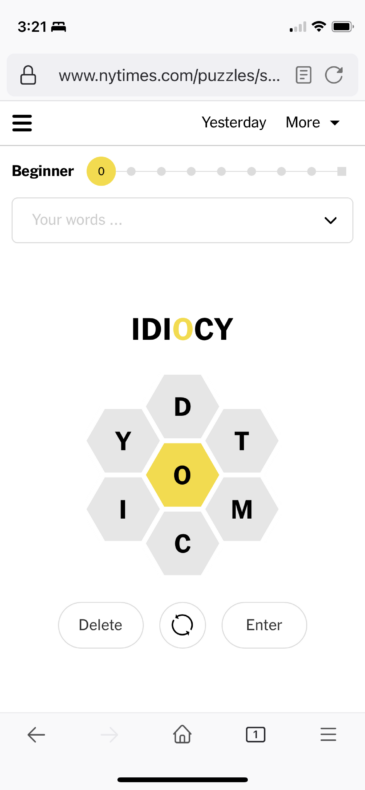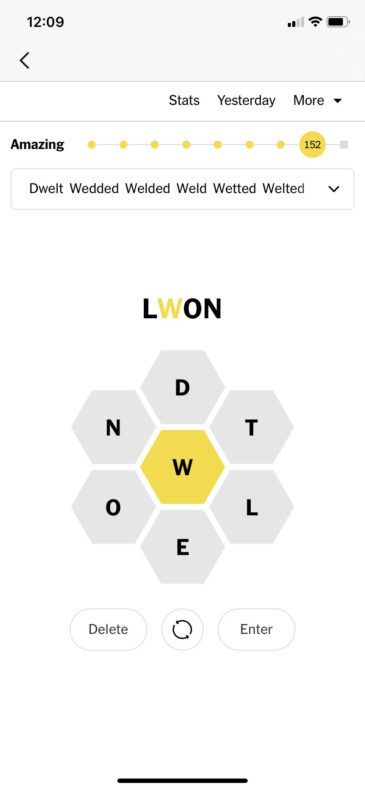Every morning, I wake up, make myself a cup of coffee, and open the Spelling Bee. For the uninitiated, Spelling Bee is a word game published daily by the New York Times, and the concept is delightfully simple: you are given seven letters arranged in the shape of a honeycomb, and you try to find as many words as you can by combining the letters in any order. Words must be longer than four letters, and they must contain the letter in the middle of the honeycomb. The longer the word, the more points you get, and every day, there’s at least one “pangram,” which uses all seven letters.

As far as I can tell, Spelling Bee does not provide long-term user stats, and this is probably for the best, because I cringe to think about how much time I’ve spent pecking at my screen for random words. I literally cannot start my day unless I find the pangram, and sometimes take my Spelling Bee prowess as an omen for the day: if the pangram is easy, the day might go well; if I’m stuck even after downing my coffee, I sense I’m in for a rough one. I have become so dependent on this habit of mine that last weekend, upon waking up in the forest, I realized I had no reception and felt a twinge of disappointment that I couldn’t do Spelling Bee while drinking my instant coffee.
Part of the fun of the game is sharing silly words with other word nerds and complaining about which words are and are not accepted. The official Spelling Bee rules are vague about its terms for inclusion; the only official rules are no cussing, and no “obscure, hyphenated, or proper nouns.” At first, my friends and I swapped screenshots of great valid words (cicada, riparian) and fun invalid words (Dorito, Jumanji, yeet). Then, I started noticing what I felt were inconsistencies in words that were and weren’t accepted, and began adding those to a list. “CAPTCHA” was invalid one week, but then valid a few weeks later. “Pika” — a common animal! — was invalid, while “yegg” — a slangy nickname for a safecracker — was valid.
I needed to make sense of the chaos. Who is the great arbiter of Spelling Bee words? Google told me it was a man named Sam Ezersky, a mid-20s puzzle editor living in the greater New York area. Ezersky seemed to have a sense of humor about his role: when hordes of angry Spelling Bee fans (who he calls the #HiveMind) came at him for rejecting the word “deglaze” on a puzzle, he tweeted puns to acknowledge the omission. I don’t know anything about Ezersky as a person, but it made sense to me that a city-dwelling man of his age might not be familiar with deglazing; I know I wasn’t until I started cooking more in my thirties.
I started to see all Spelling Bee words through the lens of Ezersky. “Ramada” was a valid word — I only knew it in the context of the hotel chain, but I learned ramadas are roofed shelters with open sides and are common in the southwest, a part of the country I regrettably haven’t spent much time in. Maybe Ezersky had, though? And he appeared to have some obscure but inconsistent knowledge of fauna and flora — he accepted “loblolly,” the tree, but not “javelina” or “anole.” I guessed he wasn’t much of a coder; “boolean” wasn’t a valid word. (Though the word derives from George Boole, I’d argue it isn’t a proper noun, or that obscure — I first learned it in 9th grade math!) He seemed up on the slang of bros: “helluva” and “tallboy” were both valid words. As other friends learned about my Ezersky theories, they began to send me their own. “Seems like he has a lot of obscure knowledge about humanities but less about science,” one friend observed. “Does Ezersky think NYT readers are too classy to know about swamp rats??” another texted angrily after she learned “nutria” was an invalid word. Searching “Ezersky” in my texts brings up a variety of unhinged messages in which we curse our Spelling Bee Dictator: “damn u ezersky!!!!,” “EZERSKY YOU KNOW NOTHING,” “<shakes fist> EZERRRSSKYYYY!!!”
I’m not even all that convinced Spelling Bee words are an accurate method of divination when it comes to someone’s personality and interests, but it’s a fun game. I don’t mean to put Ezersky on blast, and I’m sure he and I would have a lot to nerd out about if we ever met. But I will say that biggest quibble to date might be that he apparently isn’t one of the esteemed readers of the best blog on the whole world wide web, as this word was listed as invalid:

Sam, I hope you never see this, but on the off chance this somehow makes it to you: thank you for your work, which brings me joy every single day. And also please consider accepting the word “muon” from now on. It’s one of the building blocks of our universe, after all.
Oh, I wish I could be part of the Spelling Bee club, open to all who play and either think private thoughts about the game or share wildly IRL and on social media. But just like when I played video games as a child–hello, Sonic the hedgehog. goodnight, Mario Brothers. remember Ecco the Dolphin?–I often tended toward suicidal play. Every technicolor cliff seemed jumpable.
My brain shuts down at the challenge of tiles with letters on a screen, no matter how cutely arranged.
Today’s fist-shaker: Abattoir. I mean COME ON!!!
This is hilarious! My husband loves the spelling bee and has noticed inconsistencies in words that are acceptable (some slang, some not, some scientific). Thank you for revealing the name behind the game.